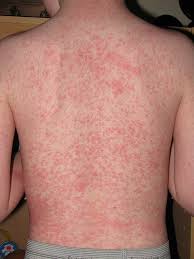• Cases sourced from abroad on the rise in state
• Disease now widespread in parts of the world
• Vaccination, other hygienic precautions urged

The department issued the following tips:
Get measles vaccine
People who cannot show that they were vaccinated as children and who have never had measles should be vaccinated.
• Infants 6–11 months of age should have 1 dose of measles vaccine if traveling internationally.
• Children in the United States routinely receive measles vaccination at 12–15 months of age
• Infants vaccinated before age 12 months should be revaccinated on or after the first birthday with 2 doses, separated by at least 28 days.
• Children 12 months of age or older should have 2 doses, separated by at least 28 days.
• Adolescents and adults who have not had measles or have not been vaccinated should get 2 doses, separated by at least 28 days.
• Two doses of MMR (measles, mumps, and rubella) vaccine is nearly 100% effective at preventing measles.
• The only measles vaccines available in the United States are the measles-mumps-rubella (MMR) and the measles-mumps-rubella-varicella (MMRV) vaccines. MMR has been used safely and effectively since the 1970s. A few people experience mild, temporary adverse reactions, such as joint pain, from the vaccine, but serious side effects are extremely rare. There is no link between MMR and autism.
Practice hygiene and cleanliness:
• Wash your hands often.
• If soap and water aren’t available, clean your hands with hand sanitizer (containing at least 60% alcohol).
• Don’t touch your eyes, nose, or mouth. If you need to touch your face, make sure your hands are clean.
• Cover your mouth and nose with a tissue or your sleeve (not your hands) when coughing or sneezing.
• Try to avoid close contact, such as kissing, hugging, or sharing eating utensils or cups, with people who are sick.
If you feel sick and think you may have measles:
• Talk to your doctor or nurse if you feel seriously ill, especially if you have a fever
• Tell him or her about your travel.
• Avoid contact with other people while you are sick.
Source: www.cdc.gov/travel

